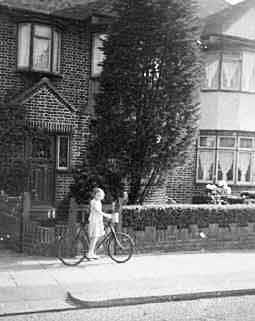House prices and inflation, based on costs from the 1930s and today
In April 1938, my father bought a semi-detached house about 4 minutes walk from the Edgware Northern Line Underground station. It was part of the new suburbia of similar new semis springing up across the country. Remarkably, documents have survived on the purchase of the house and the corresponding mortgage, and this page details them to give a measure of inflation. Huge as the inflation is, the page puts it into context by giving examples of salaries at the time and their increase over the years.
____
By the webmaster, based original family documents and inputs from others
Decription of the 1930s house
Although the general design of all the new 1930s-built semi-detached houses was identical, we were fortunate that our rooms were larger than most - which I mention only to give meaning to the prices and costs further down the page.
The hall was larger than most and the kitchen was large enough for a table and chairs and a walk-in larder - which was rather unusual. At the back of a shared side entrance there was also space for a garage. There is a plan of the layout elsewhere on this website.
We were also fortunate that the road was more elegant than most with a strip of grassland running down the middle, railed off with wrought iron railings. Sadly these railings were removed for their iron in the war effort.
9 Brook Avenue, Edgware, Middlesex, photo taken in the 1940s.
The price of the house in the 1930s
According to old documents which have remarkably survived, the price of the house in 1938 was £835. Since these houses are still giving good service today, the low price must astound you - but more follows below to indicate the huge extent of inflation.
My father put down £200 cash and used a mortgage with what was then Abbey Road Building Society, currently the Abbey National.
The mortgage
The monthly mortgage repayments were £4, as shown by my father's account book and his monthly expenditure.
The salary requirements for the mortgage
I never knew my father's salary for that time, but judging by the information in the following box, it was probably about or a little over £5 a week.
Earnings in 1939 and what could be bought with them
contributed by John Cole from personal experience and research
My father (like many others) had been out of work for most of 1926, but he was in a steady job by 1939 earning a weekly wage of £5. On this paltry sum by today's standards, he and my mother were even planning an overseas holiday, which of course the war stopped!
The price of the same house today
In 2020, I tried to find the price of an equivalent house. As an approximation, it was something between £700,000 and £800,000, but the situation, room sizes and garage space, etc cannot be exactly identical. By now, the prices would probably be higher still. You may like to work out the inflation between 1938 and 2020.
Inflation and investment
Inflation of house prices has been very severe indeed: a factor of about 1000 in 80 years. Yet what is also clear from what John Cole writes in the above box, earnings were also small by the standards of today, and so was the cost of living.
...and in the 1950s
contributed by Eric Cowley
In 1955, my first house, a newly built 3-bedroomed semi, cost just £1,750.00. I still find it difficult to reconcile today's prices with those times. I earned £9.00 per a week at the time - an increase of £1.50 because I got married.
What is also clear is that buying a house just before World War Two was an excellent investment, provided of course that it escaped the German blitz. Was my father lucky? Yes, as far as 9 Brook Avenue was concerned, but he had lent his parents money to buy a house from which they were bombed out. What he saw back from the Government after the war in compensation was comparatively insignificant.
Costs of running a house
Various pages showpages on the costs of furnishing, maintaining and living in the house.
| sources | webmaster | contact |
Text and images are copyright
If you can add anything to this page or provide a photo, please contact me.




